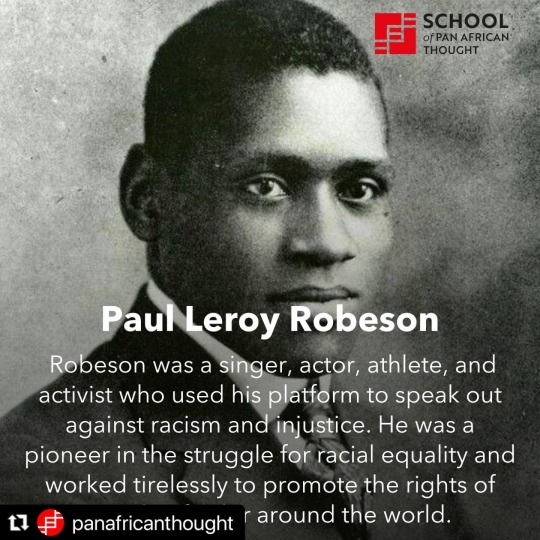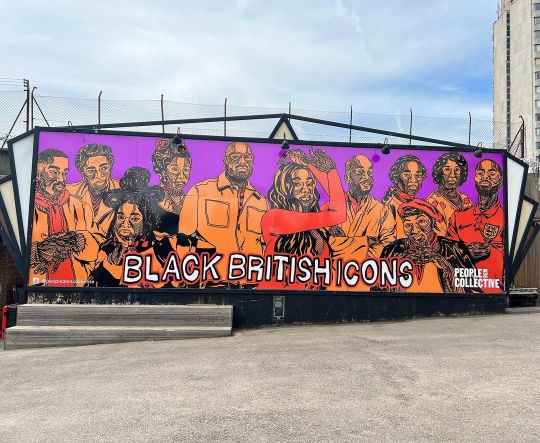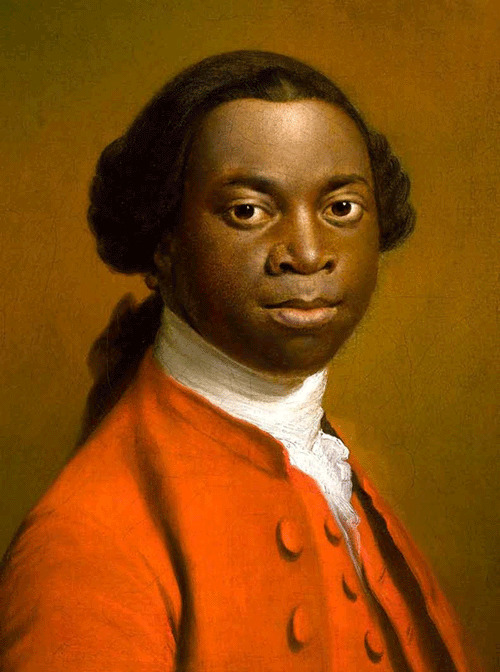#olaudah equiano
Text
rubynye replied to this post:
Olaudah Equiano: enslaved as a child, bought his own freedom, campaigned eloquently for abolition, his memoir went through nine printings at least. An erudite Black man from before many people think Black people were invented. I can't adequately express how happy seeing him in your list made me.
Equiano is a truly fascinating, compelling figure. His memoir was assigned in a grad school seminar I took on 18th-century British literature focused on various forms of resistance and dialogue among/between/about the oppressed, and it was really intriguing to read abolitionist poetry and tracts mainly by white English people across the political spectrum of their era and then Equiano's Interesting Narrative. The contrast is incredible.
He's in my dissertation for basically one passage—the account of his capture and lifelong separation from his sister. But it's a hell of a passage.
(Now that I'm thinking about it, he was also in the curriculum I designed when I took over my advisor's upper-division 18th-century class for a semester, and my undergrad students loved the Interesting Narrative, way more than the grad students in my own seminar had. Most of my students had no idea he'd even existed and they just really got into it.)
#rubynye#respuestas#olaudah equiano#eighteenth century blogging#ivory tower blogging#cw slavery#the interesting narrative of the life of olaudah equiano#nice things people say to me
28 notes
·
View notes
Text

The strong presence of the sea is grossly under-examined in American literature, doubly so in African American literature. As Elizabeth Schultz observes, "Historically and culturally, the African American experience has been an inland one. Black Americans," she continues, "have not generally turned seaward in their literature." Although she comes to a "however" that adds the observation "the sea is not absent from African American literature," the rhetorical pose imagined in the claim that "the sea is not absent" is that it will take a good deal of searching to find it. And yet, as Jeffery Bolster observes in his ground-breaking 1997 study Black Jacks, "Sailors wrote the first six autobiographies of blacks published in English before 1800". Many of these autobiographies carry clear abolitionist intent and hint at the type of anti-slavery discussions carried on by sailors around the Atlantic world. When scholars of African American literature turn their attention to works written by sailors, like Olaudah Equiano's The Interesting Narrative of the Life of Olaudah Equiano, or Gustavas Vassa, the African. Written by Himself (1789), most suffer from the misplaced assumption Schultz points to, and thus fail to see the crucial link between sailors and black abolitionism. Indeed, what Crispus Attucks, Paul Cuffee, Robert Smalls, Frederick Douglass, and so many other black revolutionaries in America have in common is that they were all sailors or in some other way directly connected to the maritime trades.
— Matthew D. Brown, 2013. “Olaudah Equiano and the Sailor’s Telegraph: The Interesting Narrative and the Source of Black Abolitionism.” Callaloo: A Journal of African Diaspora Arts and Letters 36 (1): 191–201. doi:10.1353/cal.2013.0059 (Google Drive link)
‘Drunken Sailors’ by John Locker, 1829 (NMM)
#age of sail#black history#black sailors#sailors#naval history#maritime history#atlantic world#abolitionism#black jacks#olaudah equiano#john locker#maritime art#black history month
178 notes
·
View notes
Text
I think that if I could interview any historical figure I would choose Olaudah Equiano because the amount that that man took to his grave with him. augh
17 notes
·
View notes
Text








#african#afrakan#kemetic dreams#brownskin#afrakans#africans#brown skin#african culture#olaudah equiano#Nigerian#Igbo#Ahmed Ben Bella#dude Mohammed Ali#Harold moody#eric williams#Paul Leroy Robeson
31 notes
·
View notes
Text
youtube
youtube
#lindsay holiday#tea time with lindsay holiday#history#louise marie therese#ignatius sancho#joseph bologne#olaudah equiano#dido elizabeth belle#jean amilcar#alexandre dumas#Youtube#sara forbes bonetta#ira aldridge#mary seacole#pablo fanque#fanny eaton#samuel coleridge taylor#alemayehu of ethiopia
2 notes
·
View notes
Photo


Ncuti Gatwa is featured in a mural in Margate, London, full of Black British Icons.
The icons from left to right: Ncuti Gatwa, Claudia Jones, Little Simz, Queen Charlotte, Sir Steve McQueen, Munroe Bergdorf, Sir David Adjaye OBE, Olaudah Equiano, Lady Phyll, Mary Secole, and Raheem Sterling.
Source
#ncuti gatwa#claudia jones#little simz#queen charlotte#sir steve mcqueen#munroe bergdorf#sir david adjaye obe#olaudah equiano#lady phyll#mary secole#raheem stirling#photo#2022
51 notes
·
View notes
Text
Olaudah Equiano's work is a classic in explaining the course of inhuman events with a human face:
Olaudah Equiano is the man who wrote the memoir that is the template for giving a human face to an inhuman reality. His work forms a part of an entire genre and aspect of early Black history that was capturing and describing the reality of events in an effort to fight them, and to bring them down. To write these works and to distribute them was both a political and a revolutionary act, as slavery, like most atrocities, hid itself behind a veil of secrecy and selective access to information and truth.
These realities, and the truths behind them, should be kept in mind in looking at these early sources and narratives of Black history. From the beginning Black history has always had its revolutionary and deconstructionist aspects, which is why tyrants and aspiring tyrants hate it and try to suppress it.
5 notes
·
View notes
Text
Near water so much
it seemed you could absorb
water through your skin
For the strength of Samson
if black skin could outdo
hair of biblical proportions
Your book of exploits
made tea for two volatile
dispensed with table manners
One pull on the tablecloth
disturbs things set there
in one flourish
In a Durham Cathedral window
stained glass lauded troubled
cautioned against distress
But the two qualities in me
twinned as they are cannot be separated
in a photo finish or split by time
Fred D’Aguiar, “Equiano”, Translations from Memory, 2018
0 notes
Text
OLAUDAH EQUIANO [GUSTAVUS VASSA]
The Interesting Narrative of the Life of Olaudah Equiano, or Gustavus Vassa, the African (1789)
It is difficult for those who publish their own memoirs to escape the imputation of vanity; nor is this the only disadvantage under which they labor: it is also their misfortune, that what is uncommon is rarely, if ever believed, and what is obvious we are apt to turn from with disgust.
People generally think those memoirs only worthy to be read or remembered which abound in great or striking events, those in short which in a high degree excite either admiration or pity: all others they consign to contempt and oblivion.
0 notes
Text
Skimming Briefly Through Some Historical Points, to Remind us that the Racial Condemnation we are Subject to Now, is Out-Of-Kilter.
Beliefs
People in Britain, probably more than any other country, have seen many races and cultures come to live here. Tolerant people are generally civil to others, so that, many were accepting of these different ones coming and settling. Partly because of colonialism, there was a readiness to open the country to these foreigners, from many different places. Jews and Africans had already come to Britain throughout the 1800s and earlier. Jews had come to UK in the 11th century, but during those medieval centuries, there was much unrest and upheaval. They came, at a later date, they got expelled, and so did other forms of religious cultures and peoples.
There was continual hostility between Roman Catholics and Protestants, right up until the 20th century, fed by fear of reprisal from leaders in Court circles. Race was not so much the problem as forms of Christianity. Yet, Judaism, Catholicism and Protestantism all had their basis in the twelve tribes of Israel, and the Messiah, of Whom we read in the New Testament.
Non-nationals
Describing words … cannot use certain ones today …were just that – adjectives. They may or may not have had emotions behind them, they were just useful adjectives of the time. Victorian novels unashamedly use the sensible words ‘Jews’, Negroes … and many others that I don’t dare put here, because political correctness took over where Victorian etiquette left off.
NB [Apparently Africans first came to Britain in the Roman army in 2nd and 3rd centuries]
People are Tribal
Humankind has been tribal since Biblical times. People in
many countries, even in these modern times, stare attentively at
people who do not look or behave like they do.
Having lived in the Middle East and the Far East, I can testify to that.
Offence can be taken ,,, or not. That response is usually within us all depending on upbringing, and if one grows up in a family where there is nurturing and confidence to see friendship, in the world, then offence will not be a problem to those fortunate ones. Words will not take that optimistic confidence away from such people.
Like Attracts Like
Employment, schooling, socialising … all these things are
subject to our tribal instincts. We continue to see how
communities are drawn together by their ‘alikeness’.
For one instance, take food – the food that settlers are
culturally used to, will remain their diet, and generally they do not try different foods. That is why we have Chinese, Indian, African … etc, all with their own shops and produce. These differing shopping
cultures have changed the look of many high streets.
Nevertheless … Live and Let Live.
An Alternative View Point
Racism or other types of activism are not the main problem, or even the motivation.
Rebellion, violence and an upbringing that has formed hate,
resentment and intolerance, will show itself whenever challenged
and any reason will be used by such people, just so that they can let loose what has been encouraged in the home.
The Contrite English
Too many of us, are gullible to the modern interpretationof history, too ready to accept the condemnation of our history as well as our modern-day lives. Yet consciences had to grow into the empathy that we now encourage, and life was not as it is now. The growing and developing of conscience may seem unrealistic, because every small thing, especially cute animals, makes us feel soft and emotional.
Yet the hard living of earlier times had not produced softened conscience.
Reading Elizabeth Gaskell and Charles Dickens [and the life of John Newton] can help us understand how awareness of hardship began to affect treatment towards others. The whole world has gone on the same journey, and thinking in particular of African tribes that sold their own people into slavery, [read Olaudah Equiano] also need to change their mindset.
Contrition is a Biblical trait, but on the other hand – accepting guilt that is not real, is dis-empowering.
Having said all this, we have a Creator God Who puts all things right, at the end.
#tribal#contrition#slavery#beliefs#john newton#conscience#guilt#racism#elizabeth gaskell#charles dickens#olaudah equiano
0 notes
Text

Commonplace Entry 5: Olaudah Equiano [The Middle Passage]
Olaudah Equiano exposed the mind of the enslaved African when he penned his experiences. Wrote Equiano, "I asked if we were not to be eaten by those white men with horrible looks, red faces loose hair" (982).
Thanks to the ability of Equiano to formally and adequately express himself in writing and speak for himself for the first time English, the people of England were able to reflect on their actions more acutely than ever before. What seems for the first time in English literature, white people's humanity is being questioned. It is likely that Equiano's fear for being eaten seemed absurd to those never having been in his shoes. This world view likely would have been violating to the conscience and awake the interest and compassion of the highest Society of readers, particularly those in government positions.
Equiano, Olaudah. The Interesting Narrative of the Life of Olaudah Equiano, or Gustavus Vassa, The African, Written by Himself, The Norton Anthology of English Literature, 10th Edition, Volume C, The Restoration and The Eighteenth Century, New York, London, W.W. Norton Company, 2018, pp. 982.
#critiqueofcolonialism#critiqueofslavery#18th century literature#Olaudah Equiano#TheMiddlePassage#theother#Liberty
0 notes
Text
I should be working on my dissertation, and have been, but I thought it'd be fun (for me :P) to loop you all in somehow. Therefore I bring you a very silly poll!
*best means whatever it means to you; feel free to propagandize
**yes, I deliberately excluded Shakespeare (from the poll, not the dissertation, lol)
#anghraine babbles#poll nonsense#ivory tower blogging#dissertation hell#william wordsworth#john ford#daniel defoe#thomas middleton#john webster#samuel johnson#edmund spenser#samuel richardson#michel de montaigne#henry fielding#olaudah equiano#jonathan swift#renaissance blogging#(read: early modern blogging but i'm too lazy to change my original tag)#eighteenth century blogging#sixteenth century blogging#seventeenth century blogging
23 notes
·
View notes
Note
How does (im)migration change people, without changing them entirely?
(Im)migration opens people up to new people, new experiences, and new ways of thinking
Routine and staying in one place makes people only see the same people, the same experiences, and the same ways of thinking.
1 note
·
View note
Text
The way that Equiano was only 52 (or thereabouts, his birth year isn't clear) when he died and yet had already had like every career
17 notes
·
View notes
Text
What was Olaudah Equiano's real name?
What was Olaudah Equiano’s real name?
I’ll never forget my first black history month. In year eight, whilst learning about the transatlantic slave trade, our teacher introduces us to Olaudah Equiano. Describing him as the incredible Igbo-African man who bought his freedom, travelled worldwide, and contributed to the abolitionist movement to end slavery. Although the Equiano narrative made me feel proud, I couldn’t help but wonder why…

View On WordPress
#earliest voices olaudah equiano#equiano narrative#igbo#life of olaudah equiano#nigeria#Olaudah Equiano#the interesting narrative of olaudah equiano#What was Olaudah Equiano&039;s real name?#who is olaudah equiano
0 notes
Photo

what is uncommon is rarely, if ever, believed
The Interesting Narrative of the Life of Olaudah Equiano, 1789
0 notes